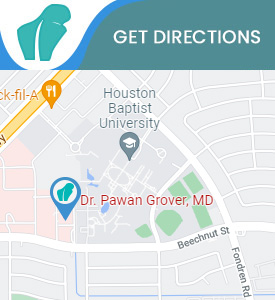Board Certified Doctor for Neuropathic Pain in Houston, TX
When it comes to managing complex conditions like neuropathic pain, having a trusted specialist makes all the difference. At InovoSpine, Dr. Pawan Grover, a board-certified physician, offers advanced diagnostic tools and cutting-edge treatment options to address the root causes of your pain. With years of expertise in interventional pain management, Dr. Grover creates personalized care plans tailored to each patient’s unique needs. For more information, contact us or book an online appointment. We are conveniently located at 1140 Business Center Dr, Suite 110, Houston TX 77043.


Table of Contents:
How is neuropathic pain different from other types of pain?
Can neuropathic pain come and go, or is it constant?
Is neuropathic pain caused by nerve damage?
Can injuries or surgeries cause neuropathic pain?
What is the approach of Dr Pavan Grover in treating neuropathic pain?
At Inovo Spine, we understand that not all pain is the same—especially when it comes to conditions affecting the spine and nervous system. One type of pain that is particularly relevant in our practice is neuropathic pain. Unlike nociceptive pain, which results from tissue damage such as sprains, fractures, or inflammation, neuropathic pain arises from injury or dysfunction within the nervous system itself. This can occur as a result of spine-related conditions like herniated discs, spinal stenosis, nerve root compression (radiculopathy), or even after spine surgery.
Our patients living with neuropathic pain often describe their symptoms as burning, shooting, stabbing, or tingling sensations—sometimes accompanied by numbness or heightened sensitivity to touch (allodynia). These symptoms can persist long after the initial spinal injury or condition has been treated, which can make neuropathic pain especially challenging to manage.
Because neuropathic pain is caused by abnormal processing or transmission of pain signals within the nerves or spinal cord, it requires a different treatment approach than nociceptive pain (which typically responds to common pain relievers like NSAIDs or acetaminophen). At Inovo Spine, our team utilizes evidence-based therapies, including specific medications such as certain antidepressants, anticonvulsants, and topical agents, as well as interventional procedures like nerve blocks or spinal cord stimulation, when appropriate.
At Inovo Spine, we recognize that neuropathic pain is a complex condition that can significantly impact your daily life. Neuropathic pain often arises from damage or dysfunction within the nervous system—frequently affecting the spine and surrounding nerves. The way this pain presents can vary from person to person. For some, it may be constant, with fluctuating intensity throughout the day. For others, it comes and goes in episodes or flare-ups, sometimes triggered by activities, stress, cold temperatures, or even simple touch. In many cases, neuropathic pain can also occur without any obvious trigger.
Common descriptions of neuropathic pain include burning, shooting, stabbing, or tingling sensations. Regardless of whether your pain is steady or intermittent, it’s essential to seek expert care. Our experienced team specializes in diagnosing and managing neuropathic pain, particularly as it relates to spinal conditions. We use advanced diagnostic tools and personalized treatment strategies to help reduce your pain and improve your quality of life.
At Inovo Spine, we recognize that neuropathic pain is a unique and challenging condition affecting many of our patients. Neuropathic pain arises when there is damage or disease impacting the somatosensory nervous system—the network of nerves responsible for transmitting sensations like touch, temperature, and pain. Unlike nociceptive pain, which results from injury to tissues such as muscles or skin, neuropathic pain specifically involves the nerves themselves.
Common causes of neuropathic pain that we see at Inovo Spine include spinal injuries, herniated discs pressing on nerve roots, diabetic neuropathy, post-surgical nerve damage, and neurological conditions like multiple sclerosis. When these nerves are damaged, they can send abnormal signals to the brain, resulting in symptoms such as burning, tingling, electric shock-like sensations, or numbness, even without an obvious cause.
Our expert team is dedicated to diagnosing the underlying source of neuropathic pain and developing personalized treatment plans. Whether your pain is due to a spine condition, nerve injury, or a chronic neurological disorder, we offer advanced therapies and compassionate care to help restore your quality of life.
At Inovo Spine, we understand that injuries or surgeries—especially those involving the spine and nervous system—can sometimes lead to neuropathic pain. Unlike typical pain caused by tissue damage, neuropathic pain arises when nerves themselves are injured or dysfunctional. This can result in symptoms such as burning, shooting, stabbing, or tingling sensations that may persist long after the original injury or surgery has healed.
Following traumatic injuries such as fractures, crush injuries, or deep lacerations, nerves in the affected area can become damaged and start sending abnormal signals to the brain. Similarly, surgical procedures—including spinal surgeries or other operations near the spine—can occasionally result in nerve injury through direct trauma, stretching, or compression of nerve tissue. This may cause neuropathic pain to develop immediately after surgery, or it may arise weeks or even months later.
Common examples of post-surgical neuropathic pain include pain following spinal surgery or procedures involving the chest, abdomen, or limbs. For example, some patients may experience post-laminectomy syndrome or chronic nerve pain after spinal fusion.
The likelihood of developing neuropathic pain depends on several factors, including the location and severity of the nerve injury, individual patient factors, and underlying health conditions such as diabetes. Every patient’s experience is unique, which is why a personalized approach to diagnosis and treatment is essential.
At Inovo Spine, our approach to treating neuropathic pain is grounded in a comprehensive, multidisciplinary philosophy that blends cutting-edge medical therapies with compassionate, patient-centered care. Our team begins each patient’s journey with a thorough evaluation, utilizing detailed medical histories, physical examinations, and advanced diagnostic testing to identify the underlying causes of neuropathic pain. We understand that neuropathic pain can result from complex conditions—such as nerve injuries, diabetes, or post-surgical complications—and we tailor each treatment plan to address the unique needs of every individual.
Central to our methodology is offering both pharmacological and interventional pain management options. Our pain specialists utilize proven medications, including anticonvulsants, antidepressants, and topical agents, to help modulate nerve pain, always mindful of the limitations and potential side effects associated with long-term drug therapy. For patients who require more than medication alone, Inovo Spine provides access to advanced interventional procedures such as nerve blocks, spinal cord stimulation, and other minimally invasive techniques designed to target pain at its source.
Our ultimate goal at Inovo Spine is not only to relieve pain, but also to restore function and enhance your overall well-being—offering renewed hope and improved quality of life for those living with challenging neuropathic pain conditions. For more information, contact us or book an online appointment. We are conveniently located at 1140 Business Center Dr, Suite 110, Houston TX 77043. We serve patients from Houston TX, Hedwig Village TX, Meadows Place TX, Missouri City TX, Hunters Creek Village TX, Spring Valley Village TX, and surrounding areas.

Additional Service You May Need
- Regenerative Medicine
- Spinal Arthritis
- Diagnostic Mapping
- Interventional Pain
- Minimally Invasive
- Spine Pain
- Radiofrequency Ablation
- Spinal Cord Stimulation
- Physical Rehabilitation
- Facet Joint Pain
- Herniated Discs
- Muscle and Joint Pain
- Post-Laminectomy Pain
- Myofascial Pain
- Peripheral Nerve Pain
- Regional Pain Syndrome









